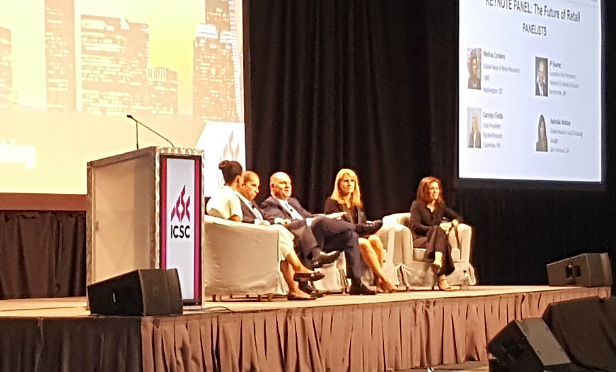 We hear a lot about experiential retail, and about how it is essential to retailer success—but what exactly does “experiential” mean? On the keynote panel at ICSC Western States, held yesterday at the Los Angeles Convention Center, retail experts talked about the future of retail, outlining convenience, technology and an omnichannel platform as being integral to a successful retail experience. The panel was moderated by Tom McGee, president and CEO of ICSC, and included Melina Cordero, global head of retail research at CBRE; Carolyn Fields, VP of Big Red Rooster; Nathalie Walton, global head of local shopping at Google; and JP Suarez, EVP at Walmart US Realty Division.
We hear a lot about experiential retail, and about how it is essential to retailer success—but what exactly does “experiential” mean? On the keynote panel at ICSC Western States, held yesterday at the Los Angeles Convention Center, retail experts talked about the future of retail, outlining convenience, technology and an omnichannel platform as being integral to a successful retail experience. The panel was moderated by Tom McGee, president and CEO of ICSC, and included Melina Cordero, global head of retail research at CBRE; Carolyn Fields, VP of Big Red Rooster; Nathalie Walton, global head of local shopping at Google; and JP Suarez, EVP at Walmart US Realty Division.
Convenience is the cornerstone of the model. Cordero opened the conversation by declaring that line will be completed eliminated—possibly in as little as five years. That means no waiting in line to check out or for help. “Technology and consumer experience is going to get rid of the line. I don't think it will exist in the future,” she said on the panel. The panelists fervently agreed, adding that technology will only aid in creating convenience for consumers, from integrating voice activated and AI technology to creating transparency in consumer inventory. “My outlook is that experience is going to drive retail,” added Suarez. “That is going to be what differentiates retailers. I think convenience is a big part of that, you can't have a line, needs to be easy.”
Technology helps to create convenience, but it does so much more, particularly for a retailer's backend. Google has retail technology available that can manage inventory, making it more easily accessible to consumers. “I think retailers will update their backend technology so that they can create a true omnichannel experience and the inventory is more accessible to the consumer,” said Walton. Google is currently leveraging technology to bring consumers to the goods that they need and want. For example, if you are driving home and need to pick up an essential, Google Assistant can help you find a nearby store and check the store's inventory to make sure they have the item in stock. “Google is connecting users to the products that they need,” added Walton. “I am trying to make sure that retailers are on Google so that we can connect the dots when a user does need something.”
Finally, an omnichannel platform marries technology and convenience. It allows consumers to shop online, to run in an pick up and quick, necessary item or to spend time and wander through the store, if they are looking to touch and feel. Walmart is focused on bringing this multi-layered model to its customers, and has been successful because of its substantial real estate footprint. That essentially allows their brick-and-mortar locations to act as distribution centers. “We make it as easy as possible to get in and get out, and when someone is an omnichannel customer, they are a stickier customer,” said Suarez. “We want to create options so you can get what you need and get out or you can shop online.”
The panel also stressed that these are needs that are true across demographic groups, not only for millennials or younger generations. Baby boomers and Gen-X are both rapid adopters of technology, and they are looking for the same convenience in retail shopping as millennials. “I like to think of everyone as a millennial,” said Fields. “Baby boomers and gen-X want the same things as millennials.” Suarez agreed, saying, “I think that is right. It doesn't matter what demographic you are. It is all about convenience. It is about how you make technology available for a customer to solve a problem.”
To close, McGee asked the panelist to give advice to retailers facing these rapid changes. Cordero said agility would be the most important for retailers. Today, the standard 10 to 15 year leases and supply chain structure no longer works, and they need to stay flexible and adapt. Suarez and Fields echoed the need for flexibility, adding that retailers need to forge partnerships as well as try new things and be comfortable with failure until they get it right. Finally, Walton closed the panel urging retailers to update their backend and inventory management systems, which are often outdated. “If your offline inventory is not online, you are missing a big opportunity,” she said. “Updating technologies to utilize voice and search is critical to success now and five to 10 years from now.”
© Touchpoint Markets, All Rights Reserved. Request academic re-use from www.copyright.com. All other uses, submit a request to [email protected]. For more inforrmation visit Asset & Logo Licensing.






